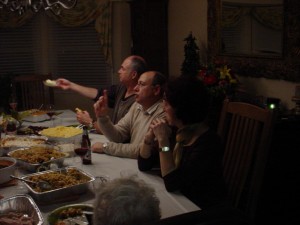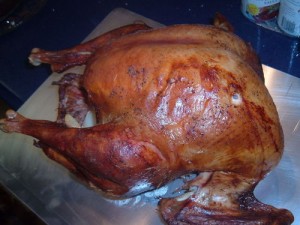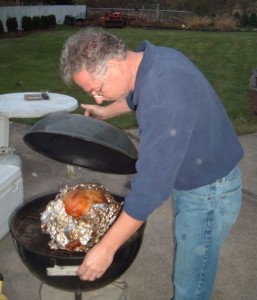
Sharing Thanksgiving Dinner with family is a really special time... a time where we express verbally our gratitude to G-d - something we should be doing every day.
Today in North America it is the holiday of Thanksgiving. My family always celebrated this holiday of thanks, as a time to get together and celebrate each other and everything we have in this life. As Jews, we can trace all of these blessings back to G-d.
Thinking back on our family celebrations, there was always one moment each year that stood out in my memory (and it wasn’t when my mom sprayed whipped cream at me straight from the can, although that stands out, too!). It was the moment when we went around the table and each of us proclaimed what we are grateful for. Of course, everyone was happy to declare their gratitude for family, friends, food, and shelter. Then there was me. I was always grateful for the same thing: indoor plumbing.
Well, there is a lot to be said about not taking the little things for granted! When traveling in places like India or Nepal or rural Fiji, there often was no indoor plumbing. If you were lucky, there was a hole in the ground into which you could pour some water after you’ve used it. If you weren’t, well, there were always tress and bushes! There were times in our travels that I would have given up a lot just to have the luxury of a hot shower and a clean bathroom.
In this week’s parsha we meet Esav (Esau), who famously comes to his brother Yaakov (Jacob) after a hunting expedition. Yaakov is cooking a red lentil soup because his grandfather Avraham has passed away and lentils, being round, represent the circle of life. It is a mourner’s meal. Yet, Esav bursts into the tent and demands that Yaakov “pour that red stuff down [his] throat.” He has no concern for the meaning and importance of the meal. All he cares about is the food that is before him, so great and uncontrollable is his hunger. Not only does he demonstrate callous indifference for the death of his grandfather or his mourning family, but he tosses his birthright aside as well. All for the sake of a bowl of red lentils.
We all have things we crave in life. For me, it could be indoor plumbing, for you it could be steak, and for Rabbi Ben I’m pretty sure it’s fruit. Yet, most of us have a hard time putting ourselves in Esav’s position, where we would carelessly throw away something precious to us in exchange.
…Or would we?

Having to use "toilets" like this one in India made me even more grateful for indoor plumbing, when I have it!
The truth is that many of us would throw away something important to us for the sake of a momentary pleasure or to satisfy a craving or desire. The sad thing is that we, like Esav, do it without even realizing until much later exactly what we’ve done. Those of us who drive too fast because we are in a hurry to meet our friends at the restaurant are literally risking our lives, not just our birthrights. And those of us who crave that McDonald’s cheeseburger or pepperoni pizza wantonly toss away the chance at a mitzvah just to satisfy a craving, and so that our style won’t be cramped. Yet, sadly, it is not until we reach the World to Come that we will be fully aware of our mistakes.
It doesn’t have to be this way. We do not always need to be as Esav, chasing after our momentary desires, pleasures, and ego. The key is in awareness. We must notice exactly what we want but – instead of running after it – walk slowly after it, or put it aside until a later time. We must remember to express our gratitude instead of blindly chasing after our desires. If it is indoor plumbing for which we are thankful, let’s remember to stop and make a blessing to thank G-d for it after we’ve used it. If it is a cheeseburger we want, let us stop and thank G-d that we have pareve cheese or veggie burgers so that we can have a kosher version – and then let us make a blessing before and after eating to thank G-d directly. No matter what our desire is, there is a way to learn self-control and a way to learn to express our thanks, whether it is by making a blessing or doing a mitzvah. This is the lesson we can learn from Thanksgiving and from Esav.
Happy Thanksgiving and Shabbat Shalom!
Read More











